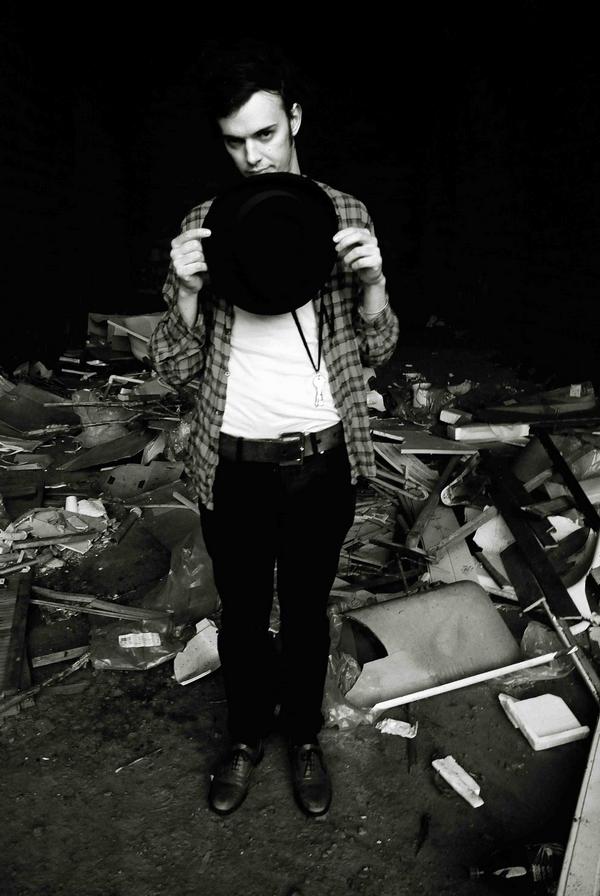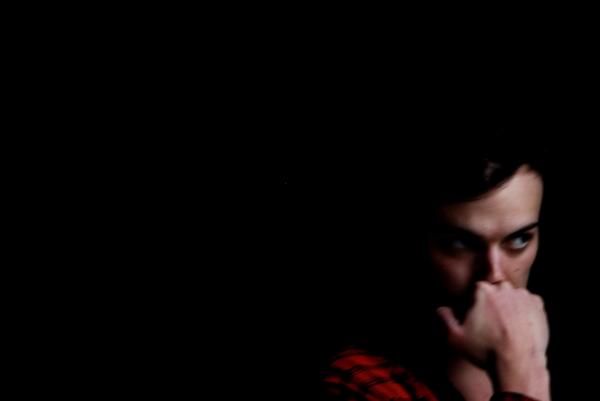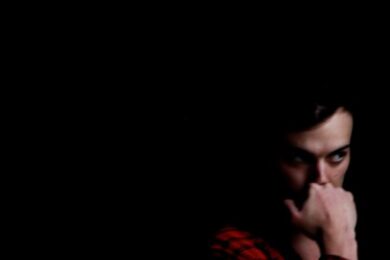You know that standard story about how the artist found their own voice? Well, Rudi Zygadlo used to make breakcore. Breakcore.
This shocks me because when I was sent his album Great Western Laymen, I thought it was one of the best and funniest things I’d heard in ages. Fusing bendy treble synths, the laser wobble bass of cheap dubstep and psychedelically phased vocals in multilayered arrangements, it sounded like a brilliant kind of glam pop. And I took it to be a brilliant, witty comment on what some of my friends and I have been jokily calling jizz-step – you know, that dubstep that sounds like a big mindless ejaculation (as Ikonika pointed out here).
On ‘Perfect Lust’, for example, barely discernible vocals mixed up with bubbling synths mutate in a lovely swaying half-step. The dramatic synths and filtered vocals of ‘Layman’s Requiem’ are pure glam genius, while ‘Songs of Praise’ is wobble galore with vocals like David Byrne at his most flexible and mellifluent. Rudi also taps into the recent vogue for machinated (not auto-tuned) vocals in tracks by the likes of Joker, 2000F, Dam Funk, Darkstar et al.
Rudi is 21. His surname is anglicised Polish; his grandparents were Polish emigrants after the war. He grew up in Dumfries and moved to Glasgow four years ago to study Literature and Slavonic Studies, and says he especially likes the works of Czech writers like Bohumil Hrabal, Václav Havel, and Milan Kundera because they dealt with the Slavonic dilemma of addressing political issues under communist censorship with an especial humour.
The Quietus also discovered that he only recently discovered Glaswegian aquacrunk synth maestro Rustie, doesn’t like Joanna Newsom’s boyfriend, and – genius! – he wants to make the electronic music version of the Catholic Mass.
Would you say you’re a funny person?
Rudi Zygadlo: Am I?? I don’t know, I guess I can be! You put me on the spot…
Well I think your music might have a certain sense of humour to it, but maybe that’s just to the listener and not to you.
RZ: It might do. Some of it’s tongue-in-cheek. I’ve actually never thought about it, to be honest.
Which bits are tongue-in-cheek?
RZ: Oh I dunno. Lyrically there’s stuff that’s sort of . . . ‘Perfect Lust’, have you listened to that one? I’m not gonna tell you what the lyrics are. It’s a sort of voyeur looking across the road at a woman that he never meets . . . [he mumbles a bit]. It’s a load of rubbish really.
It’s a load of rubbish? No it’s not! Is it you singing all the lyrics?
RZ: Yep.
What are you using on your voice?
RZ: I guess none of it’s dry, you’ve mostly got effects. There’s no auto-tune or anything. I just harmonised with myself mostly, because the recording quality of my voice is usually really bad. I’ve got a really lo-fi set up so I always feel it needs beefing up by harmonising. So all the vocals on the album are harmonised, apart from the ones which are vocoded. There’s never just the sort of raw voice. But apart from that there’s no fake enhancement, really.
So most of the effects are the vocoder?
RZ: Yeah. There’s a vocoder on ‘The Man In the Duck’ and a little bit on ‘Stop/Reject’ at the end. But apart from that the vocals are all just myself harmonised with myself. Actually on ‘Perfect Lust’ there’s a strange filter. But nothing very high-tech about it.
So what’s your live set-up?
RZ: For recording it’s just . . . I’ve just got a laptop with Reason on it and I just record the vocals into GarageBand or Ableton and lock them into Reason. There’s some live instruments on there as well. But it’s a pretty small setup.
So what will your setup for that be?
RZ: Well that’s the question. I have a bit of an equipment crisis at the moment. I stuck my MIDI controller in the washing machine – it was wrapped in a jumper – so it’s broken. But I’m aiming to be singing live and playing a bit of [electric] guitar and keys and computer sequenced. I’ll have done a couple of the tunes like that, but also just doing sort of a laptop DJ set sort of thing and make that as interesting as possible. I need to concentrate on that a little bit more.
This is probably a bit boring for you, but for people who are not from Glasgow, everyone’s kind of heard of Numbers, Rustie, LuckyMe and Jackmaster etc. Do you know them?
RZ: Not really, no. Well, no: I don’t. I’ve met Dom from LuckyMe once. I put on a gig at Stereo a few months ago and he played a set. But it’s quite interesting – like, people sort of naturally associate me with these Glasgow producers that you mentioned but I haven’t been involved with any of them at all. And it’s just a sort of recent thing that I even really know about them to be honest. I think people will look for the similarities because of the geographical association but I don’t really think there’s much likeness to be honest.
That’s interesting because I didn’t know you were from Glasgow and I suppose I did make the association to them specifically, but I was thinking you had quite a lot in common with Joker et al doing mad mid-range synth stuff with a little bit of dubstep reference in there as well. Would you agree?
RZ: I’m certainly more aware of that sort of stuff than I have been of the Glasgow stuff to be honest. I don’t really listen to a lot of the stuff one might expect or what you might think my music sounds like.
Do you listen to dubstep?
RZ: More recently I feel like I’ve been forced into it a bit more, yeah. And I totally know that I’ve used dubstep sounds and characteristics, that was a concious decision. But I’m not really up to speed really on who’s doing what and what all the subgenres and all sorts are.
That’s all pretty boring anyway.
RZ: Yeah. I’m wary of exposing myself to too much because I think that if I listen to all these things too much I’d start to emulate a style, and I don’t really want to do that. I want to retain my individual style and not go too far in one direction.
So you said it was conscious to use those dubstep – I’m not sure ‘references’ is the right word really – those dubstep tropes…
RZ: I find that before the tunes from this album it was a sort of . . . all the tracks off this album were made last year and that was the most prolific period I’ve ever had making tunes. Before that I’d maybe make one or two a year and they’d never be finished. But I found just sort of experimenting with these dubstep characteristics, being bass driven and simplifying my drums, opened up a lot of doors and I realised, ‘Well, I can do quite a lot with that’. Because before that I was trying to make sort of break-core-y stuff, which I was failing at. I mean, my production is not great and I don’t really like . . . I wasn’t getting anywhere with that for years. And then last year I just started experimenting with what we’re calling dubstep characterstics. I’m not really sure they are dubstep characteristics – that’s what I thought dubstep was.
Like that snare…
RZ: Yeah. I’m drifting away from that now but that’s what started me off.
What tempo are they? Are they 140?
RZ: 130-140 really, I think there’s one tune on that album which is 145, ‘Perfect Lust’. And actually ‘Laymans’ Requiem’ is 95 I think, so that’s different altogether.
The ‘Great Western’ part of the album title refers to the fact that Rudi currently lives on Great Western Road in Glasgow. It begins to emerge that not only has Rudi absorbed all his nearest familial and geographical surroundings and churned them up his glam-step imaginary, but that he has had one of the most brilliant musical ideas of the past 60-ish years.
So what’s the layman bit about?
RZ: ‘Layman’s Requiem’ is about a guy climbing up a church spire and he falls. The lyrics are ‘Would you lose your balance standing, tiptoed on a spire, climb the heights, reach the weather-vane, you can’t reach from afar’. And then he falls through the spire and lands in the middle of a Sunday mass and then they say ‘Gather ostracise this layman!’ You know the end of that tune, that’s got a sort of choral end? [He sings it] ‘Gather ostracise this layman, the one who could not find the door’…
Where did you get that idea from?
RZ: Well it comes from the concept of the album which is quite vague, but since I’ve had to start talking about it I’ve had to give it more significance. But because I live on Great Western Road that’s the reference. But laymen is the sort of archaic meaning, an unordained member of the church, and I can see two churches out my window where I’m standing right now just opposite the road so I guess it’s the vibe of being sort of on the border of an ecclesiastical place . . . so these churches are a sort of looming presence on the album, that’s where that theme comes from. And being an unordained member of this church.

Are you family religious?
RZ: No not at all actually. My mum was brought up a Catholic and I did used to go to Sunday mass every so often with my gran when I was a kid. I think I quite enjoyed it actually, I was sort of intrigued.
Did you sing?
RZ: Yep.
Oh yeah, everyone has to sing don’t they…
RZ: Well the music’s good. That’s one of the best things about it. Another thing was that originally I had this idea of setting the words of the latin mass to electronic music.
Has no-one done that yet? It’s such a good idea.
RZ: Well historically hundreds of composers did it, commissioned by the church or whatever, but I don’t think anyone’s done the electronic version, which was sort of my initial idea – just because it solved the question of having to write lyrics [laughs]. So I was just going to sing it all in latin…but I think that’s what set me off on this theme and everything seemed to fit into place with these churches.
Well you have to do it now…
RZ: I’ll come back to it.
…because if I put it in the interview then someone might read it and think: ‘oh my god that’s such a good idea I have to do it.’
RZ: I know, that’s the thing. I’ve already had to . . . it’s funny, like I was saying before, these things didn’t seem that important to me at the time – all this lyrics and sort of inspiration – but when you have to answer, when you’re repeating yourself a lot, they suddenly become more significant to you.
Aside from helping Rudi examine his Catholic dreams I also discovered that he does indeed admire psychedelic jazz by the likes of late Miles Davis, Herbie Hancock, Chick Corea and the Mahavishnu Orchestra, and that "Frank Zappa was my favourite musician of all time for a long time". When we discussed folk and Joanna Newsom and her boyfriend, who made that "stupid" spoof song uncannily titled ‘Jizz In My Pants’, he concluded: "It’s such a shame that she’s going with this guy."



